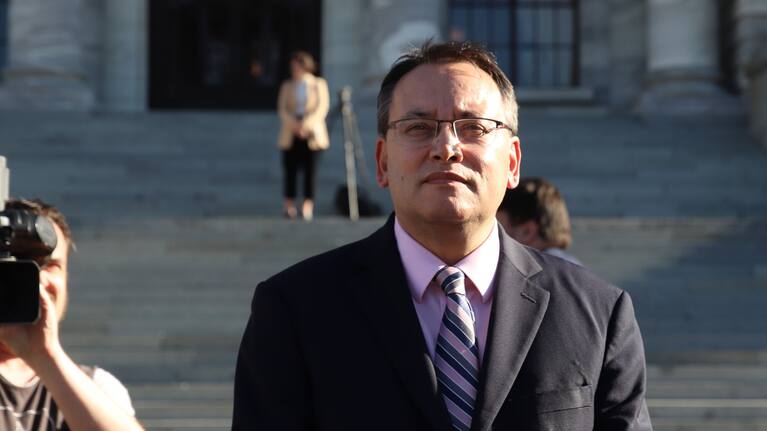Māori Crown Relations Minister Kelvin Davis says there is neither equality nor equity in Aotearoa, in response to what he described as the Opposition's "goal to slash and burn" agencies or policies designed to create equity for people "who haven't benefited by a system” which is “propped up by and for the benefit of predominantly privileged Pākehā men”.
In his speech in Parliament on Wednesday night, Davis, who is of Ngāpuhi descent, spoke of his tupuna (ancestor) who signed Te Tiriti o Waitangi “in the mistaken belief” his valued possessions and resources would be his forever.
“But that was a lie. His property rights were forgotten. He was told he couldn't collect the customs duties; only the Crown could. His pā and gardens were torched. He was arrested and imprisoned without trial or charges.
“My hapū in the day were left with nothing.”
If they abolish such agencies, Davis said: “The Opposition fail to acknowledge that their prosperity was made off the back of my whānau's misery.”
ACT this week released its alternative budget, which would see government agencies like Te Puni Kokiri - the Ministry of Māori Development and the Human Rights Commission abolished.
National has since refused to rule out the policy, if it were to form a coalition with ACT, with leader Christopher Luxon saying those conversations would be had next year, but also that it is not National Party policy.
In response to Davis' speech, David Seymour said he agreed that "greater equity" was needed in New Zealand, and that if Davis had read ACT’s Real Change Budget, "he would have learned that we are proposing the opposite of protecting the status quo".
"Achieving equity is about bringing real change and having the best policies in the world, something we are a long way from," said Seymour.
“ACT has always said, if a government department can explain what value it is adding to the lives of New Zealanders, it should stay. But neither Kelvin (Davis), nor Willie Jackson, have been able to explain what impact these departments are having. Has the Ministry of Māori Development improved the literacy rates or wages for Māori. If so, how?

In his speech, Davis said his hapū could have used a Ministry of Māori Development back in the day “to help them get back on their feet”, and Te Arawhiti, the Office for Māori Crown Relations would have been useful too, “because I can tell you at that point the relationship between the Māori and the Crown was pretty sour”.
“They could have done with the Human Rights Commission because their human rights were horribly violated and, as most of us are a product of our upbringing, the lack of equality through the generations has led to gross inequity,” he said.
His tupuna's descendants could have had lives of prosperity if Te Tiriti o Waitangi had been honoured, Davis said, but instead he estimated around 80% lived on the breadline.
“Equality means that we should start on the same playing field and that we should all have the same shot but history has meant we don't start on the same playing field,” Davis said.
“There is neither equality nor equity in Aotearoa and the Opposition's goal to slash and burn the Ministry of Māori Development, the Office for Māori Crown Relations, the Ministry for Women, the Human Rights Commission, the winter energy payment, and the fees-free scheme are all examples of agencies or policies designed to create equity for those who haven't benefited by a system historically designed and propped up by and for the benefit of predominantly privileged Pākehā men.”
Davis accused the Opposition of wanting "to protect the status quo", a system "that looks after their needs".
"They conveniently overlook the fact that their wealth, their privilege, and their authority were built off the backs of other people's misery and the entrenched inequality across generations," he said.
He also spoke of the inequitable health outcomes for Māori, and pointed to comments made by National's Shane Reti recently around life expectancy for Māori since 1840.

"It would be nice if we could live as long as non-Māori and enjoy our superannuation for as long as non-Māori, given we too paid taxes for our entire working lives, although I hear that Shane Reti he wants us to be happy that we don't die in our 30s as we did 182 years ago at the signing of Te Tiriti o Waitangi.
"He and his party's top aspiration for Māori is for us to be grateful that we are alive."
Earlier this week, Reti explained his comments.
"The case was made to me that over decades Māori health hasn't improved, and the point I was making was that if we look back to 1840, Māori life expectancy was around 30 years, today it's about 73.4. Clearly there has been improvements, and I think we need to be careful we don't diminish the work of many good people who have brought it to this point.
He went on to say he had been concerned about the $50 spend difference of Pharmac between Māori and non-Māori for "effectively the same medical conditions".
"There is a range of situations where Māori clearly perform worse than non-Māori."


















SHARE ME